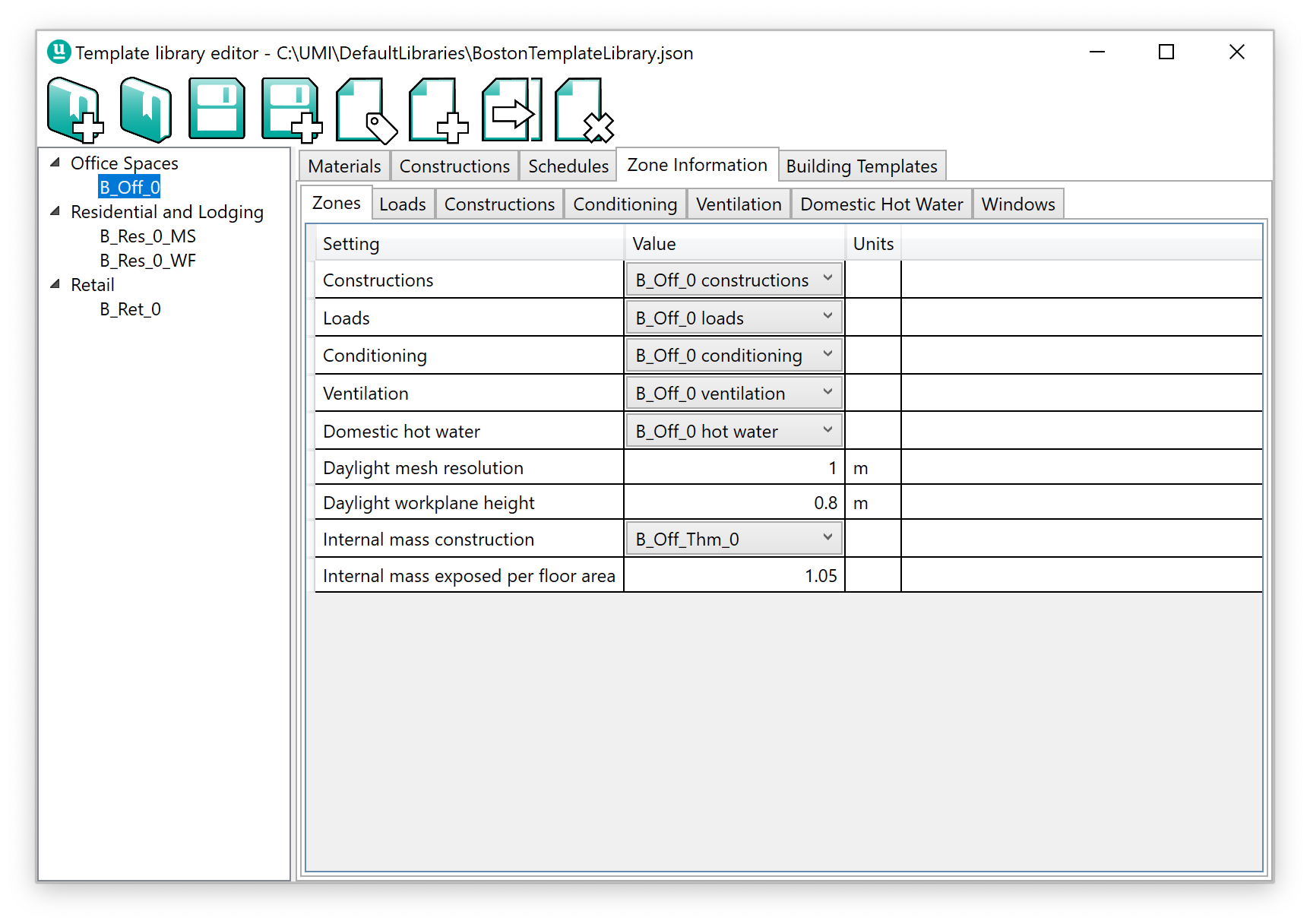archetypal.template.ZoneDefinition
- class archetypal.template.ZoneDefinition(Name, Constructions=None, Loads=None, Conditioning=None, Ventilation=None, DomesticHotWater=None, DaylightMeshResolution=1, DaylightWorkplaneHeight=0.8, InternalMassConstruction=None, InternalMassExposedPerFloorArea=1.05, Windows=None, area=1, volume=1, occupants=1, is_part_of_conditioned_floor_area=True, is_part_of_total_floor_area=True, multiplier=1, zone_surfaces=None, is_core=False, **kwargs)[source]
Zone settings class.

Initialize
Zoneobject.- Parameters
Name (str) – Name of the object. Must be Unique.
Constructions (ZoneConstructionSet) –
Loads (ZoneLoad) – Loads of the zone defined with the lights, equipment and occupancy parameters (see
ZoneLoad)Conditioning (ZoneConditioning) – Conditioning of the zone defined with heating/cooling and mechanical ventilation parameters (see
ZoneConditioning)Ventilation (VentilationSetting) – Ventilation settings of the zone defined with the infiltration rate and natural ventilation parameters (see
VentilationSetting)DomesticHotWater (archetypal.template.dhw.DomesticHotWaterSetting) –
DaylightMeshResolution (float) –
DaylightWorkplaneHeight (float) –
InternalMassConstruction (archetypal.OpaqueConstruction) –
InternalMassExposedPerFloorArea –
Windows (WindowSetting) – The WindowSetting object associated with this zone.
area (float) –
volume (float) –
occupants (float) –
**kwargs –
- property Constructions
Get or set the ZoneConstructionSet object.
- property Loads
Get or set the ZoneLoad object.
- property Conditioning
Get or set the ZoneConditioning object.
- property Ventilation
Get or set the VentilationSetting object.
- property DomesticHotWater
Get or set the DomesticHotWaterSetting object.
- property DaylightMeshResolution
Get or set the daylight mesh resolution [m].
- property Category
Get or set the Category attribute.
- property Comments
Get or set the object comments.
- property DataSource
Get or set the datasource of the object.
- property Name
Get or set the name of the object.
- property allow_duplicates
Get or set the use of duplicates [bool].
- duplicate()
Get copy of self.
- extend(other, allow_duplicates)
Append other to self. Modify and return self.
- float_mean(other, attr, weights=None)
Calculates the average attribute value of two floats. Can provide weights.
- get_unique()
Return first object matching equality in the list of instantiated objects.
- property id
Get or set the id.
- property predecessors
Get or set the predecessors of self.
Of which objects is self made of. If from nothing else then self, return self.
- to_ref()
Return a ref pointer to self.
- property DaylightWorkplaneHeight
Get or set the DaylightWorkplaneHeight [m].
- property InternalMassConstruction
Get or set the internal mass construction object.
- property InternalMassExposedPerFloorArea
Get or set the internal mass exposed per floor area [-].
- property Windows
Get or set the WindowSetting object.
- property occupants
Get or set the number of occupants in the zone.
- property area
Get or set the area of the zone [m²].
- property volume
Get or set the volume of the zone [m³].
- property is_core
Get or set if the zone is a core zone [bool].
- property multiplier
Get or set the zone multiplier.
Note: Zone multiplier is designed as a “multiplier” for floor area, zone loads, and energy consumed by internal gains.
- property is_part_of_conditioned_floor_area
Get or set is part of conditioned area [bool].
- property is_part_of_total_floor_area
Get or set is part od the total building floor area [bool].
- property zone_surfaces
Get or set the list of surfaces for this zone.
- classmethod from_dict(data, zone_conditionings, zone_construction_sets, domestic_hot_water_settings, opaque_constructions, zone_loads, ventilation_settings, **kwargs)[source]
Create a ZoneDefinition from a dictionary.
- Parameters
data (dict) – The python dictionary.
zone_conditionings (dict) – A dictionary of ZoneConditioning objects with their id as keys.
zone_construction_sets (dict) – A dictionary of ZoneConstructionSet objects with their id as keys.
domestic_hot_water_settings (dict) – A dictionary of DomesticHotWaterSetting objects with their id as keys.
opaque_constructions (dict) – A dictionary of OpaqueConstruction objects with their id as keys.
zone_loads (dict) – A dictionary of ZoneLoad objects with their id as keys.
ventilation_settings (dict) – A dictionary of ZoneConditioning objects with their id as keys.
**kwargs – keywords passed to the constructor.
{ "$id": "175", "Conditioning": { "$ref": "165" }, "Constructions": { "$ref": "168" }, "DaylightMeshResolution": 1.0, "DaylightWorkplaneHeight": 0.8, "DomesticHotWater": { "$ref": "159" }, "InternalMassConstruction": { "$ref": "54" }, "InternalMassExposedPerFloorArea": 1.05, "Loads": { "$ref": "172" }, "Ventilation": { "$ref": "162" }, "Category": "Office Spaces", "Comments": null, "DataSource": "MIT_SDL", "Name": "B_Off_0" }
- classmethod from_epbunch(ep_bunch, construct_parents=True, **kwargs)[source]
Create a Zone object from an eppy ‘ZONE’ epbunch.
- Parameters
ep_bunch (eppy.bunch_subclass.EpBunch) – The Zone EpBunch.
construct_parents (bool) – If False, skips construction of parents objects such as Constructions, Conditioning, etc.
- combine(other, weights=None, allow_duplicates=False)[source]
Combine two ZoneDefinition objects together.
- Parameters
other (ZoneDefinition) – The other object.
weights (list-like, optional) – A list-like object of len 2. If None, the volume of the zones for which self and other belongs is used.
Todo
Create Equivalent InternalMassConstruction from partitions when combining zones.
- Returns
the combined Zone object.
- Return type